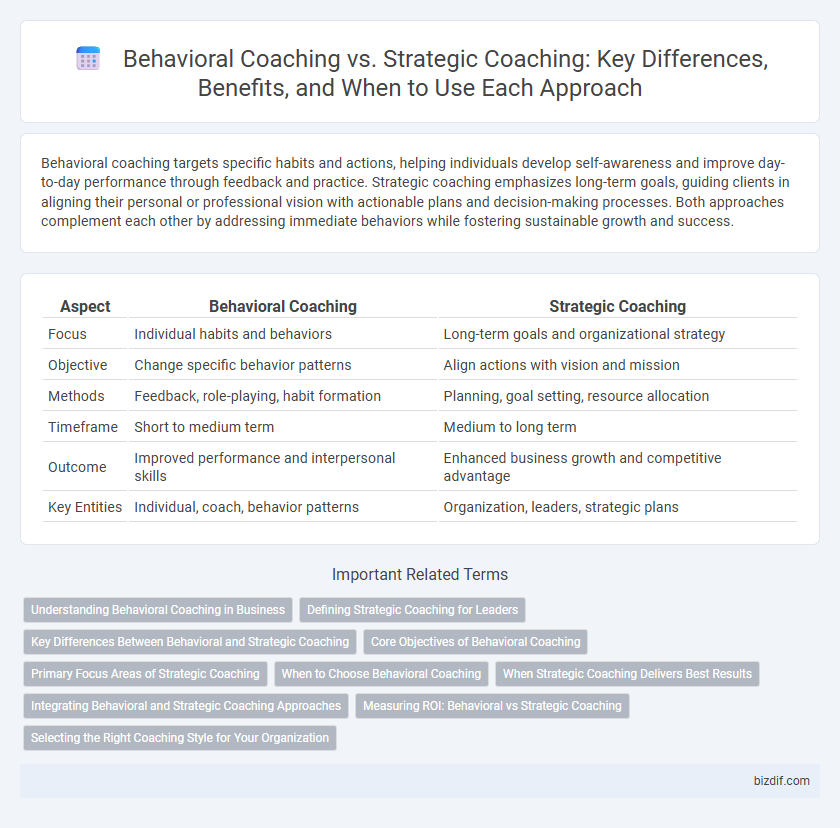Behavioral coaching targets specific habits and actions, helping individuals develop self-awareness and improve day-to-day performance through feedback and practice. Strategic coaching emphasizes long-term goals, guiding clients in aligning their personal or professional vision with actionable plans and decision-making processes. Both approaches complement each other by addressing immediate behaviors while fostering sustainable growth and success.
Table of Comparison
| Aspect | Behavioral Coaching | Strategic Coaching |
|---|---|---|
| Focus | Individual habits and behaviors | Long-term goals and organizational strategy |
| Objective | Change specific behavior patterns | Align actions with vision and mission |
| Methods | Feedback, role-playing, habit formation | Planning, goal setting, resource allocation |
| Timeframe | Short to medium term | Medium to long term |
| Outcome | Improved performance and interpersonal skills | Enhanced business growth and competitive advantage |
| Key Entities | Individual, coach, behavior patterns | Organization, leaders, strategic plans |
Understanding Behavioral Coaching in Business
Behavioral coaching in business targets improving employees' habits, communication, and interpersonal skills to enhance overall workplace dynamics and productivity. This coaching approach emphasizes self-awareness, emotional intelligence, and consistent behavior change to align individual actions with organizational goals. Unlike strategic coaching, which focuses on long-term planning and decision-making, behavioral coaching addresses immediate personal development to foster effective teamwork and leadership.
Defining Strategic Coaching for Leaders
Strategic coaching for leaders centers on aligning personal development with organizational goals to enhance decision-making, vision setting, and long-term planning. It emphasizes cultivating leadership skills that drive sustainable growth and adaptability in complex business environments. This coaching framework integrates goal-oriented strategies with behavioral insights to optimize leadership effectiveness and impact.
Key Differences Between Behavioral and Strategic Coaching
Behavioral coaching centers on modifying specific actions and habits through feedback and reinforcement to improve performance and interpersonal skills. Strategic coaching focuses on long-term goal setting, decision-making frameworks, and aligning personal or organizational objectives with broader visions. Key differences include behavioral coaching's emphasis on immediate behavior change, while strategic coaching prioritizes planning and systemic thinking for future growth.
Core Objectives of Behavioral Coaching
Behavioral coaching primarily targets the enhancement of individuals' habits, actions, and interpersonal skills to improve overall performance and personal development. It focuses on increasing self-awareness, emotional regulation, and communication effectiveness to foster positive behavior changes. This form of coaching aims to build resilience and adaptability, enabling clients to navigate workplace challenges and strengthen relationships.
Primary Focus Areas of Strategic Coaching
Strategic coaching primarily focuses on long-term goal setting, decision-making frameworks, and aligning actions with an individual's or organization's vision for sustainable growth. It emphasizes high-level planning, leadership development, and navigating complex challenges to maximize overall effectiveness. This coaching approach integrates analytical thinking and adaptability to drive strategic outcomes and organizational success.
When to Choose Behavioral Coaching
Behavioral coaching is ideal when individuals need to develop specific habits, improve interpersonal skills, or modify actions that directly impact performance and workplace dynamics. It focuses on observable behaviors, making it effective in situations requiring immediate change in communication, teamwork, or leadership style. This approach is essential when measurable behavior adjustments lead to better outcomes in personal and professional environments.
When Strategic Coaching Delivers Best Results
Strategic coaching delivers best results when individuals or organizations face complex decisions requiring long-term vision and structured action plans. This approach emphasizes goal-setting, resource allocation, and performance metrics to drive measurable progress. Behavioral coaching is less effective in these scenarios, as it primarily targets mindset and habits rather than strategic execution and outcomes.
Integrating Behavioral and Strategic Coaching Approaches
Integrating behavioral and strategic coaching approaches enhances overall performance by addressing both mindset and actionable goals, creating a comprehensive development plan. Behavioral coaching focuses on modifying limiting beliefs and improving emotional intelligence, while strategic coaching emphasizes goal setting, planning, and execution strategies. Combining these methods fosters sustainable behavior change alongside targeted achievement, leading to improved productivity and long-term success.
Measuring ROI: Behavioral vs Strategic Coaching
Measuring ROI in behavioral coaching focuses on improvements in individual performance, mindset shifts, and enhanced emotional intelligence, which often translate into increased productivity and reduced turnover over time. Strategic coaching ROI is assessed through tangible business outcomes such as revenue growth, market expansion, and improved organizational alignment, providing a direct connection to company-wide goals. Both coaching types deliver measurable benefits, but strategic coaching offers clearer quantifiable business impact, while behavioral coaching yields long-term cultural and performance enhancements.
Selecting the Right Coaching Style for Your Organization
Behavioral coaching emphasizes improving individual habits, emotional intelligence, and interpersonal skills, making it ideal for teams needing enhanced collaboration and personal development. Strategic coaching focuses on aligning leadership goals with organizational vision, driving performance through long-term planning and decision-making frameworks. Selecting the right coaching style depends on your organization's current challenges, whether prioritizing employee mindset shifts or achieving strategic business objectives.
Behavioral Coaching vs Strategic Coaching Infographic

 bizdif.com
bizdif.com